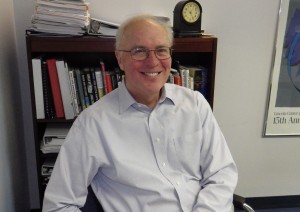With the multinational corporation and longtime Fairfield County occupant General Electric considering packing its bags, the area”™s skilled workforce and strategic location will continue to draw new companies in spite of potential challenges, says Christopher Bruhl, president and CEO of The Business Council of Fairfield County.
“Fairfield County has always been a place where change happens,” Bruhl said. “We”™re close enough to this huge change engine called New York City, but we”™re far enough away from it that we”™ve always had to carve out our own identity. We are a destination for people.”
The metro economy and the people and companies that settle in the area have always shaped Fairfield County, Bruhl said. About three out of four “knowledge workers” (those with a four-year degree) in the county were born in another state or country, he said.
The county has reinvented itself with a smaller workforce that receives higher compensation, resulting in high-class medical care, Apple stores and bars that sell pricey drinks, Bruhl said.
The economy is the sum of its parts, and businesses coming and going is natural, according to Bruhl. Companies do not decide to move for one reason, like taxes, but because of other factors that could have been building up for a long time, he said. These could include changes in the industry, business model or customer base, he said.
“There are always other and deeper business reasons ”” it”™s not just somebody flipped a switch and said, ”˜bad climate,”™” Bruhl said. “It may have been building for a long time and then people come to a recognition of that.”
In a Connecticut Business & Industry Association survey of nearly 200 state business leaders in January, 31 percent said expanding their customer base was the greatest challenge to growth, followed by finding new workers at 21 percent and the tax burden at 20 percent.
Peter Gioia, CBIA economist and vice president, said business owners face a lot of challenges. “Connecticut offers an educated workforce and great quality of life, but our tax structure and business climate are starting to make businesses think twice about being here,” Gioia said in a statement.
Fairfield-based GE has said it is considering leaving Connecticut after the recently passed state budget included increased taxes on businesses. Now that its GE Capital subsidiary is being sold, GE is predominately an industrial company that may want to explore broader options for its headquarters, Bruhl said.
According to Bruhl, sometimes companies that choose to come to the state evolve here and others evolve in different directions. Companies can either adapt, ask their environment to adapt or go elsewhere, he said. Bruhl said they have the obligation to explore other places that could be better for business.
“If a company comes to a conclusion that their needs aren”™t being met, it”™s no longer a good fit, well then they have to go somewhere that they can compete,” he said. “On the other hand someone else will come, because we will be a fit for them because of our strengths.”
Bruhl said advantages of doing business in the state are the talented and skilled labor pool in a global knowledge economy, due to the proximity to large markets, large media and a large financial center. The state attracts global companies because it”™s on the Eastern seaboard, making it close to Europe, and is centrally located in the corridor between Boston and Washington, D.C., he said.
Employers also appreciate that schools like Sacred Heart University, Fairfield University and the University of Connecticut-Stamford offer graduate programs in the county, allowing them to re-educate their workforce without employees having to leave their jobs, Bruhl said.
A challenge in the county is that, besides Stamford, it is not a compelling place for young professionals to live, Bruhl said, but added that it is changing. Still, it is difficult for startups to be able to compensate talent well enough to live in the Fairfield County, he said.
Bruhl said the state should be aware of the trends of who is leaving and who is coming. Some business leaders would say the state should focus on the businesses they have here rather than recruiting new ones, he said.
“Established economies do welcome incoming companies, but they are less susceptible to growth by recruitment and more susceptible to growth by helping their existing companies grow,” Bruhl said.



















